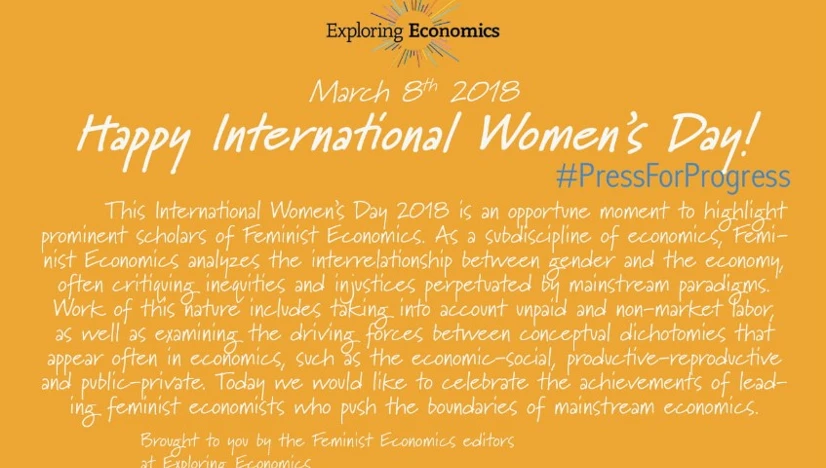Happy International Women’s Day!

Happy International Women's Day!
This International Women’s Day 2018 is an opportune moment to highlight prominent scholars of Feminist Economics. As a subdiscipline of economics, Feminist Economics analyzes the interrelationship between gender and the economy, often critiquing inequities and injustices perpetuated by mainstream paradigms. Work of this nature includes taking into account unpaid and non-market labor, as well as examining the driving forces between conceptual dichotomies that appear often in economics, such as the economic-social, productive-reproductive and public-private. Today we would like to celebrate the achievements of leading feminist economists who push the boundaries of mainstream economics.
Marilyn Waring
Marilyn Waring began her career as the youngest person ever elected to New Zealand’s parliament in 1975. Waring continues to focus on issues governance, public policy, gender analysis and human rights as a Professor of Public Policy. Waring’s book, If Women Counted, was a seminal contribution to the field of feminist economics, highlighting the gender inequities and devaluation of nature built into and reproduced by national accounts such as GDP. In addition to her academic work, Waring has consulted for the United Nations, and is a filmmaker, writer and activist.
Cristina Carrasco
Cristina Carrasco is a Chilean-Spanish economist researching domestic labour, female labour and non-male oriented indexes. She is a prominent researcher in the field of feminist economics and currently a Professor at Universidad de Barcelona. On why Economics has not yet been disturbed by feminist economics, Carrasco argues i) economics is still very dominated by one paradigm (neoclassical); ii) it is still very male-dominated; iii) it does not consider the need to reproduce the labour force.
Alicia Girón
is a Mexican economist and researcher at the Economy Research Institute (Instituto de Investigaciones Económicas) in Mexico City. Her areas of research include fiscal and financial economy, and gender economics, particularly with respects to financial circuits at the macroeconomic and microeconomic levels. Amongst other academic responsibilities, Alicia Girón is part of the UN’s High-Level Panel on Women’s Economic Empowerment, and previously served as the president of the International Association for Feminist Economics.
Diane Elson
Diane Elson is a British economist, sociologist, and gender and development social scientist. A recipient of the Leontief Prize for Advancing the Frontiers of Economic Thought in 2016, she is noted for her work on issues of development and human rights. Her recent work on gender inequality and economic and social rights includes the book Budgeting for Women’s Rights: Monitoring Government Budgets for Compliance with CEDAW (Concepts and Tools). She has also worked as a special advisor for UNIFEM, and is currently the chair of the UK’s Women’s Budget Group as well as Professor Emerita of sociology at the University of Essex.

